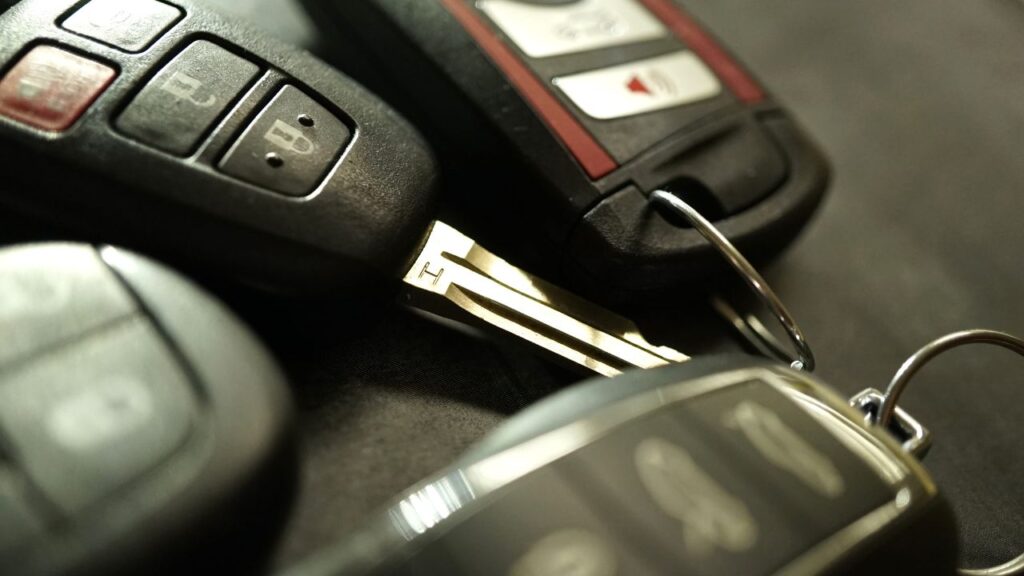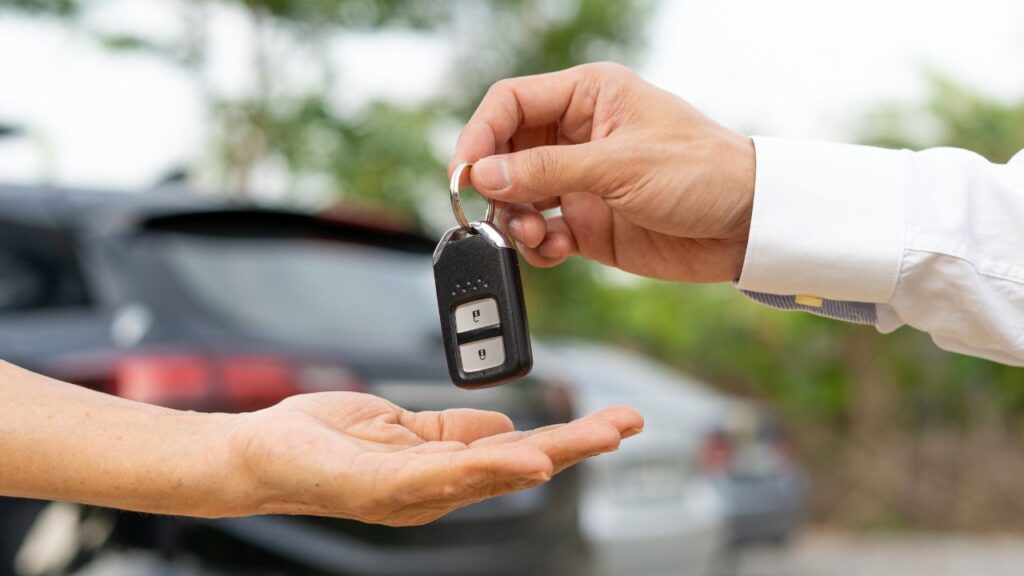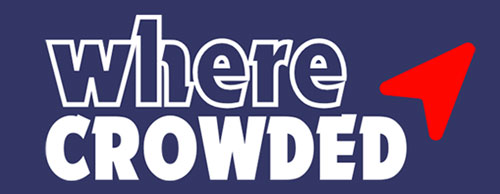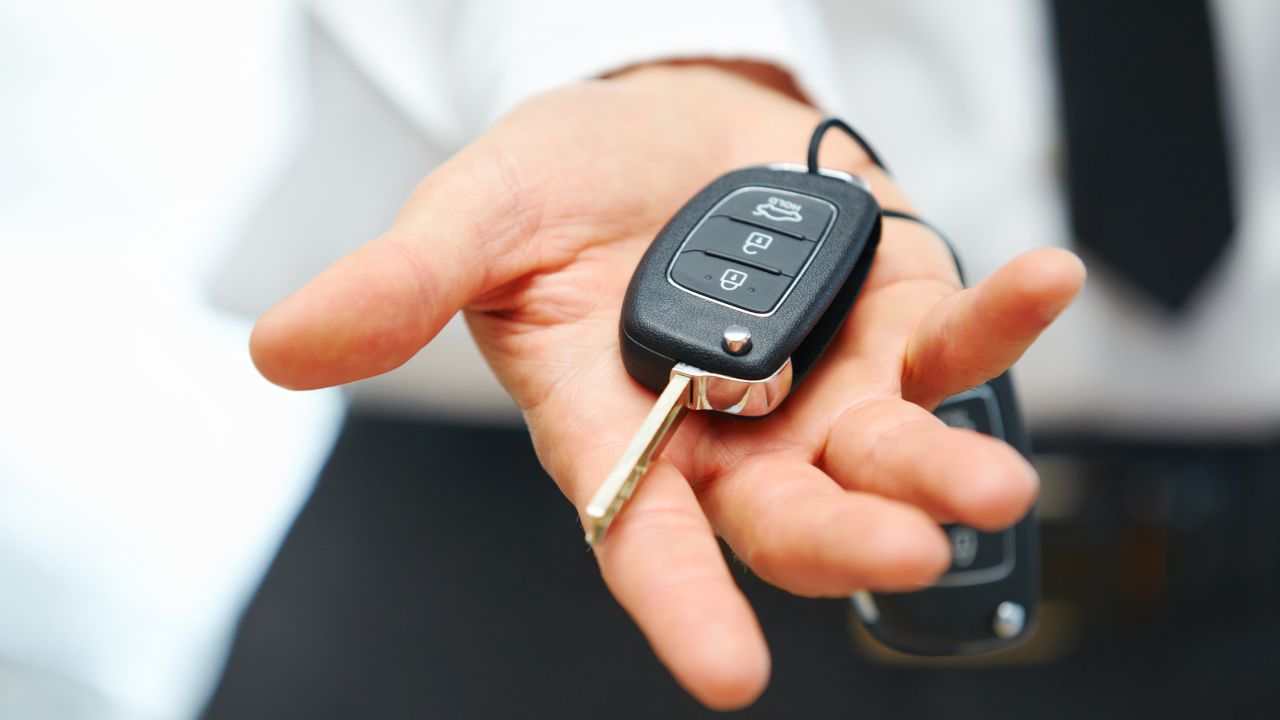Before diving into the costs, it’s crucial to know what kind of key your car uses. They’re not all the same, and this hugely impacts the price and complexity of replacement. The evolution of car keys reflects a journey towards enhanced security and convenience, but this technological advancement often comes with a higher price tag when a replacement is needed.
A. Understanding The Different Types Of Car Keys
1. Traditional/Basic Keys. These are the old-school metal keys, much like a standard house key, that physically turn in the ignition or door lock. Predominantly found in older car models, they lack any electronic chips for security. Their simplicity means they are generally the easiest and cheapest to replace.
2. Transponder Keys (With Chip). These keys might look like their traditional counterparts on the outside, but they harbor a hidden secret: a tiny microchip, known as a transponder, embedded in the plastic head. This chip communicates wirelessly with your car’s immobilizer system, an anti-theft feature.
If the car doesn’t recognize the chip’s unique code, the engine won’t start, even if the key blade correctly turns the ignition. Consequently, replacing a transponder key involves more than just cutting a new metal blade; the new chip must also be programmed to match your car’s system, making them more expensive than basic keys.
3. Remote Key Fobs (With Buttons For Lock/Unlock). Many drivers are familiar with these keys, which feature buttons to remotely lock or unlock car doors, open the trunk, and sometimes activate a panic alarm. These fobs often integrate a traditional or transponder key blade with the electronic remote functions. Replacing them means programming not only the remote functions but also potentially a transponder chip, which adds to the overall cost.
4. Smart Keys / Keyless Entry Fobs (Push-Start . Proximity). Representing the higher end of key technology, smart keys allow for keyless entry and ignition. Often, the car can be unlocked and started with a push-button while the fob remains in a pocket or bag, thanks to proximity sensors. These keys are highly electronic and maintain constant communication with the car’s computer systems. Due to their advanced technology and the intricate programming required, they are generally the most complex and, therefore, the most expensive to replace.

B. What Affects The Price Of Replacing Or Duplicating A Car Key
It’s not just the type of key that dictates the final bill for a replacement. Several other factors come into play, making each situation somewhat unique and influencing the overall expense.
1. Key Complexity: As outlined previously, the inherent technology within the key is a primary cost driver. A smart key, with its advanced electronics and programming needs, will inevitably cost more to replace than a simple, traditional metal key. The more electronic components and sophisticated programming involved, the higher the price is likely to be.
2. Car Make, Model, and Age: The brand and model of the vehicle play a significant role. Luxury or high-end vehicles, such as those from Mercedes-Benz or BMW, often feature more complex and proprietary key systems and security features, leading to higher replacement costs.
Manufacturers of premium cars frequently use specialized technology that can be more expensive for third parties to access and replicate. An older report even noted that replacing keys for high-end cars could be substantially costly due to advanced systems like remote keyless entry and Frequency Operated Buttons (FOBs) requiring more skilled technicians.
Even within the same brand, a newer model may incorporate a more advanced (and thus costlier to replace) key than an older version.
3. Programming Requirements: Most modern car keys, including transponder keys, remote key fobs, and smart keys, require electronic pairing or ‘programming’ to the specific vehicle they operate. This process demands specialized diagnostic equipment and technical expertise, forming a significant portion of the replacement cost. Some sources indicate programming alone can add a substantial amount to the bill.
4. Do You Have a Spare Key? (Duplication vs. All Keys Lost): The presence or absence of an existing, working key dramatically impacts the cost and complexity. If a spare key is available, creating a duplicate is generally a cheaper and simpler process. The crucial point here is that the cost to duplicate a key, remote, or fob is considerably less than it is to originate one from scratch.
If all keys are lost, the procedure becomes more involved and expensive. In such cases, the locksmith or dealer might need to create a key from scratch, potentially involving access to the car’s Engine Control Unit (ECU) or immobilizer system, and this complexity is reflected in the price.
5. Where You Get It Done: Dealer vs. Locksmith: This is a significant consideration. Generally, authorized car dealerships tend to charge more for key replacement services than independent automotive locksmiths. Read our article on the advantages and disadvantages of replacing your car key at an authorized car dealer versus an automotive locksmith.
6. Time of Day and Location (Emergency Services): Urgency and accessibility also influence cost. If a key replacement is needed outside of regular business hours, or if the service provider has to travel to a remote location, expect to pay additional fees for emergency call-outs.
Some locksmiths, like Master Key Automotive, offer 24-hour emergency services, which, while convenient, typically come at a premium. If the situation isn’t critical, waiting for standard business hours can often result in savings.

C. What Much Does It Cost To Replace Or Duplicate A Car Key In Singapore?
The actual cost for a car key replacement in Singapore can vary significantly based on all the factors previously discussed, key type, car make and model, programming needs and whether it’s a duplication or an “all keys lost” scenario. Always obtain a direct quote from the service provider for your specific situation.
1. Basic Key Duplication (if you have a working key)
- This is typically the most affordable service. Some locksmiths advertise prices starting from as low as $5.
2. Transponder Key Replacement
- Locksmiths: Generally, one might expect to pay between $50 and $250. More complex transponder keys or programming requirements could push this towards $350. For instance, Car Key Zone offers transponder key programming, with prices implied to be affordable.
- Dealers: Costs are likely to be higher, potentially ranging from $200 to $500 or more.
3. Remote Key Fob Replacement
- Locksmiths: Prices could range from approximately $100 to $400+. Some forum users have reported duplicating remote keys for around $100 to $200. One individual mentioned getting a replacement fob with programming done by a local locksmith for $105, a significant saving compared to the dealership quote.
- Dealers: These can easily cost between $200 and $650, and potentially much more for continental or luxury brands.
4. Smart Key/Keyless Entry Fob Replacement
- Locksmiths: If a locksmith has the capability, prices might fall in the $200 to $500+ range. One-Stop Keys Station is listed as offering smart key programming, though specific prices aren’t detailed.
- Dealers: This is where costs can escalate significantly, often ranging from $300 to $800+, and sometimes exceeding $1000 for high-end luxury vehicles or the latest, most complex systems.
5. “All Keys Lost” Scenario
In situations where all car keys are lost, expect the costs to be at the higher end of the ranges mentioned above, or even to exceed them. This is due to the increased complexity of originating a new key, the extensive labor involved, and the potential need for immobilizer or ECU reprogramming. Locksmiths like Soxxi Master specifically advertise “All Keys Lost Solution” services, indicating specialized capability in this area.
D. Will My Car Insurance Cover The Cost Of Replacing A Car Key?
The answer, unfortunately, is not straightforward: it depends entirely on the specifics of your car insurance policy. It’s important to understand that most standard car insurance policies in Singapore do not automatically cover the cost of lost or damaged keys. Key replacement is often considered an ancillary expense rather than a core coverage item.
Potential Coverage (Often as Add-ons or under Premium Plans):
Some insurers in Singapore do offer coverage for car key replacement or lock replacement, but this is typically available as an optional add-on benefit or included as part of a more premium insurance package.
- AIG Singapore: Their Auto Insurance policies (AutoPlus, AutoPlan, AutoValue) state that they will cover the cost of replacing a stolen car’s lock and key, up to a limit of S$800. They also provide coverage for locksmith or towing costs if keys are accidentally locked inside the car, though an excess applies. The critical detail here is that the primary coverage is often for stolen keys, not necessarily keys that are simply lost.
- FWD Singapore: Their Comprehensive Car Policy documents mention that if the policyholder has opted for this specific benefit, the insurer will pay the cost to replace keys or access devices that are lost, stolen from the car, or damaged in an accident. A condition for this coverage is that the theft or loss must be reported to the police.
Key Conditions for Claims:
Even when coverage is available, there are usually conditions:
- Coverage is often limited to keys that are stolen, and a police report is typically required as proof.
- There’s usually a claim limit, for example, the S$800 limit mentioned by AIG.
- An excess, which is the amount the policyholder pays out-of-pocket before the insurance coverage kicks in, usually applies to these claims.
What’s Usually Not Covered:
Standard policies or even add-on covers are unlikely to pay for:
- Simply misplacing keys due to carelessness.
- Damage to keys that was not caused by a covered event like an accident or theft.
Given that modern car keys, especially smart keys, can be very expensive to replace, it’s a prudent step to inquire about specific “key cover” add-ons when purchasing or renewing your car insurance policy. This proactive approach can provide financial protection against a potentially hefty bill. Don’t assume you’re covered; always verify.


